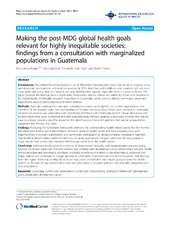| dc.contributor.author | Ruano, Ana Lorena | en_US |
| dc.contributor.author | Sánchez, Silvia | en_US |
| dc.contributor.author | Jerez, Fernando José | en_US |
| dc.contributor.author | Flores, Walter | en_US |
| dc.date.accessioned | 2014-11-17T14:23:30Z | |
| dc.date.available | 2014-11-17T14:23:30Z | |
| dc.date.issued | 2014-10-10 | eng |
| dc.identifier.issn | 1475-9276 | |
| dc.identifier.uri | https://hdl.handle.net/1956/8754 | |
| dc.description.abstract | Introduction: The United Nations presented a set of Millennium Development Goals that aimed to improve social and economic development and eradicate poverty by 2015. Most low and middle-income countries will not meet these goals and today there is a need to set new development agenda, especially when it comes to health. The paper presents the findings from a community consultation process carried out within the Goals and Governance for Global Health (GO4Health) research consortium in Guatemala, which aims to identify community needs and expectations around public policies and health services. Methods: Through a participative and open consultation process with experts, civil society organizations and members of the research team, the municipalities of Tectitan and Santa Maria Nebaj were selected. A community consultation process was undertaken with community members and community leaders. Group discussions and in-depth interviews were conducted and later analyzed using thematic analysis, a qualitative method that can be used to analyze data in a way that allows for the identification of recurrent patterns that can be grouped into categories and themes, was used. Findings: Following the Go4Health framework’s domains for understanding health-related needs, the five themes identified were health, social determinants of health, essential health needs and their provision, roles and responsibilities of relevant stakeholders and community participation in decision-making. Participants reported high levels of discrimination related to ethnicity, to being poor and to living in rural areas. Ethnicity played a major role in how community members feel they are cared for in the health system. Conclusion: Achieving health goals in a context of deep-rooted inequality and marginalization requires going beyond the simple expansion of health services and working with developing trusting relationships between health service providers and community members. Involving community members in decision-making processes that shape policies will contribute to a larger process of community empowerment and democratization. Still, findings from the region show that tackling these issues may prove complicated and require going beyond the health system, as this lack of trust and discrimination has permeated to all public policies that deal with indigenous and rural populations. | en_US |
| dc.language.iso | eng | eng |
| dc.publisher | BioMed Central | eng |
| dc.rights | Attribution CC BY | eng |
| dc.rights.uri | http://creativecommons.org/licenses/by/4.0 | eng |
| dc.subject | Guatemala | eng |
| dc.subject | Community participation | eng |
| dc.subject | Community consultations | eng |
| dc.subject | Go4Health | eng |
| dc.subject | Millennium development goals | eng |
| dc.subject | Sustainable development goals | eng |
| dc.title | Making the post-MDG global health goals relevant for highly inequitable societies: findings from a consultation with marginalized populations in Guatemala | en_US |
| dc.type | Peer reviewed | |
| dc.type | Journal article | |
| dc.date.updated | 2014-10-28T20:03:04Z | |
| dc.description.version | publishedVersion | en_US |
| dc.rights.holder | Copyright 2014 Ruano et al.; licensee BioMed Central Ltd. | |
| dc.rights.holder | Ana Lorena Ruano et al.; licensee BioMed Central Ltd. | |
| dc.source.articlenumber | 57 | |
| dc.identifier.doi | https://doi.org/10.1186/1475-9276-13-57 | |
| dc.source.journal | International Journal for Equity in Health | |
| dc.source.40 | 13 | |

